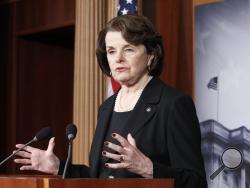Islamic State wants to 'spill our blood,' Congressional leader warns
Posted: September 1, 2014 - 3:00am
WASHINGTON (AP) -- Leaders of the House and Senate intelligence committees on Sunday prodded President Barack Obama to take decisive action against what they say are growing threats from Islamic State militants on U.S. soil.
The lawmakers, one Republican and one Democratic, offered bipartisan pressure on the White House to turn back the hazard of Islamist fighters who have taken control of vast swaths of Syria and Iraq. Those militants now are looking toward the United States or Western Europe for its next targets, lawmakers said.
Without offering specifics on any threats or suggestions how to confront them, the lawmakers said Obama soon needs to develop a comprehensive strategy to crush the fighters.
"His foreign policy is in absolute free-fall," said Rep. Mike Rogers, a Michigan Republican who heads the House Intelligence Committee.
In another TV interview, Sen. Dianne Feinstein, the California Democrat who leads the Senate intelligence panel, said Obama is perhaps "too cautious" in his approach to combatting the Islamic State group.
"This is a group of people who are extraordinarily dangerous," Feinstein said. "And they'll kill with abandon."
The pair of lawmakers, who have access to some of the nation's most sensitive secrets and receive regular and detailed briefings from the nation's spy agencies, offered dire predictions of an attack on the United States or its European allies if the militants are not confronted.
"They have announced that they don't intend to stop," Feinstein said. "They have announced that they will come after us if they can, that they will, quote, 'spill our blood.'"
The threat, Rogers said, could include Americans who have trained with Islamic State fighters. He said there are hundreds of Islamic State-trained Americans who can return to the U.S. with their American passports.
"I'm very concerned because we don't know every single person that has an American passport that has gone and trained and learned how to fight," Rogers said.
Rogers said U.S. intelligence agencies were tracking the Americans who are known to have traveled to the region. If they helped Islamic State fighters, he said, they should be charged under laws that prohibit Americans from aiding terrorists.
"ISIL would like to have a Western-style attack to continue this notion that they are the leading jihadist group in the world," Rogers said, using another name for the group.
The top Democrat on his intelligence panel, Rep. C.A. Dutch Ruppersberger of Maryland, was more skeptical. He said more needs to be known before judging whether they plan to commit terrorist acts in the U.S. any time soon. The group's priority now seems to be to hold on to territory it has gained rather than export violence.
"It is extremely urgent, but you don't just rush in," he said.
It was a view shared by Rep. Adam Smith, a Washington state Democrat on the House Armed Services Committee: "We can't simply bomb first and ask questions later."
Sen. John McCain, an Arizona Republican who serves on the Senate Foreign Relations Committee, urged fast action and said Islamic State fighters "must be defeated, not contained," because they represent a direct threat to the U.S.
Added Homeland Security Committee member Rep. Peter King, R-N.Y.: "The longer we wait, the more dangerous" the group becomes.
Feinstein said she has seen nothing that compares to the viciousness of the militants who have overrun large portions of Iraq, killed civilians and beheaded American journalist James Foley. The Islamic State group has financing, military structure and weapons unlike any other militants, she said.
Obama said Thursday he did not yet have a strategy for dealing with the Islamic State organization, a remark that brought criticism from Democrats and Republicans. In an interview published early this year by The New Yorker, the president appeared to minimize the group by comparing it to a junior varsity basketball team. The White House said he was speaking about a different threat posed by a range of extremists across the world.
Feinstein said she thought the basketball analogy was wrong -- "I think it's a major varsity team" -- but would not say whether she thought Obama projected weakness by admitting he had no strategy.
"I think I've learned one thing about this president, and that is he's very cautious," she said. "Maybe in this instance, too cautious. I do know that the military, I know that the State Department, I know that others have been putting plans together. And so hopefully, those plans will coalesce into a strategy."
Feinstein spoke to NBC's "Meet the Press." Rogers appeared on "Fox News Sunday." Ruppersberger was on CNN's "State of the Union." McCain, Smith and King were interviewed on CBS' "Face the Nation."
___
Follow Philip Elliott on Twitter: http://www.twitter.com/philip_elliott

